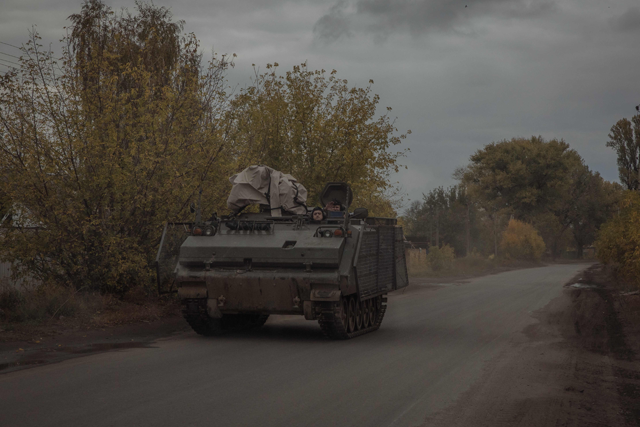KYIV, Ukraine — Ukrainian President Volodymyr Zelensky this week finally unveiled his much anticipated "victory plan" to end the grinding war with Russia, but the ambitious roadmap has been met with scepticism in Kyiv.
Its announcement comes as Ukraine faces mounting pressure to find an exit strategy as its troops suffer battlefield losses and Moscow intensifies its strikes on infrastructure.
In central Kyiv, 20-year-old Alyona said she fully believed Ukraine could win the war and that she hoped Ukraine's allies would help implement Zelensky's five-point plan.
But she said that she had her doubts.
"I think it's not very realistic but it is never too late to hope," she told AFP, adding that "we really need a lot more resources to win".
The "victory plan," which Zelensky was presenting to Ukraine's European allies in Brussels on Thursday, calls first and foremost for an immediate invitation for Kyiv to join NATO -- a prospect widely viewed as far fetched.
The Ukrainian leader has also said it would envisage the deployment of a "comprehensive" but non-nuclear force on his country's territory so that Moscow would not attack again.
And the plan also calls for allowing Ukraine to hit military targets inside Russia with Western-supplied long-range weapons, a common appeal from Kyiv to its partners abroad.
'Big doubts'
"I have very big doubts," said Anatoliy, a Kyiv resident, asked whether the "victory plan" could serve as a silver bullet to end the war, now lurching through its third year.
He was concerned about how corruption -- seen as a systematic political and social problem in Ukraine -- was undermining the war effort.
"It's absolutely horrible. I think it's not inspiring at all, especially for those people who are really defending us," he told AFP.
Corruption was also a key concern for Oleksiy Moroz, another Kyiv resident, who said Ukraine needed to work to resolve domestic issues as well as appeal for help from abroad.
"It seems that we are either begging or demanding something to make us feel good, but we are not doing anything for it," he told AFP.
Georgiy, a 56-year-old war veteran, was also doubtful whether the plan could make a meaningful difference on the ground in Ukraine, where Russian forces and their proxies have been deployed for a decade.
"We have very serious problems. And what Zelensky says is what Zelensky says. We have problems that have not yet been solved," he said.
In particular, the veteran criticised Ukrainian men who have fled the country rather than staying to fight.
"There are not enough people. The Americans and NATO will not give us people. They can help us with equipment, with money, but not with people. And there are very few people," he added.
'Force Russia to peace'
The mood on the street stands in stark contrast to the reaction to the plan from Zelensky's aides and political allies.
The governor of the war-battered Donetsk region, which Russia claimed to have annexed in late 2022 despite not having full military control over the industrial territory, voiced his support.
"Now it is time to force Russia itself to peace -- a real, just and lasting peace," Vadym Filashkin wrote on social media.
"Such a peace is possible only if we win. And that is exactly what the plan announced by the president today leads to," he said shortly after Zelensky addressed lawmakers in Kyiv on Wednesday.
A senior aide to Zelensky, Mykhaylo Podolyak, meanwhile told Ukrainian television: "The logic of this plan is for our partners to understand that we need resources in this war."
The former commander-in-chief of the Ukrainian army and now Ukraine's ambassador to the United Kingdom, Valery Zaluzhny, described the "victory plan" as "necessary".
"Without a common, global strategy," he said, "it will be difficult for Ukraine to do anything" without foreign help.
"And what about the collective West? Is it still afraid of escalation?" he asked in London.
